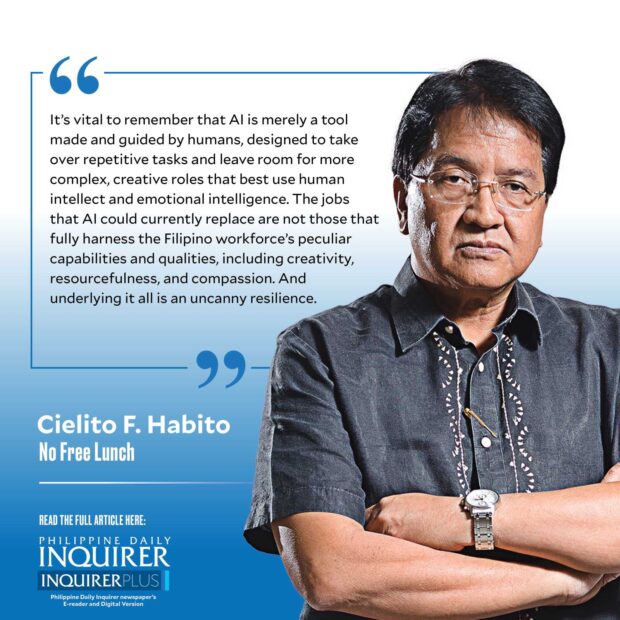Job killer or job shifter?

If you haven’t tried it yet, ask your nearest techie to help you download into your smart device any of the common AI tools now freely available. I’ve “played” with the popular ChatGPT for weeks, and apart from helping me with some research, I’ve even had it write me a few haikus to honor a retiring Japanese colleague. With simple poetry already within its capabilities, can human creativity be replicated by machine learning, thus threatening jobs that involve tasks beyond the repetitive, noncreative, and those that need minimal human intervention? Should we really fear a future where most humans are relegated to relative insignificance, and with it, widespread poverty?
In a country where various forms of business process outsourcing (BPO) have been key contributors to jobs and incomes—and often a ready option for many a college graduate—it is in this sector that AI’s threat is most closely watched. It’s now well known that over the last two decades, the Philippines has assumed global prominence in the BPO sector, now employing over a million Filipinos. But AI is now shifting the ground beneath their feet, and conversational AI tools like ChatGPT are transforming the landscape faster than earlier expected. My techie son-in-law showed me a message from a friend in the customer support industry, who shared the following information with him: “We had to lay off 90 percent of our support team because of this AI chatbot. Tough? Yes. Necessary? Absolutely. (Average) time to first response went from 1 minute 44 seconds to instant! Resolution time went from 2 hours 13 minutes to 3 minutes 12 seconds. Customer support costs were reduced by 85 percent.”
Article continues after this advertisementSo the looming question is: Will AI kill huge numbers of Filipino jobs in the BPO sector? Will it make it much harder for today’s graduates to find gainful employment? Before we start imagining dystopian scenarios, it’s vital to remember that AI is merely a tool made and guided by humans, designed to take over repetitive tasks and leave room for more complex, creative roles that best use human intellect and emotional intelligence. The jobs that AI could currently replace are not those that fully harness the Filipino workforce’s peculiar capabilities and qualities, including creativity, resourcefulness, and compassion. And underlying it all is an uncanny resilience.
Secretary Balisacan argued that rather than fear AI, new graduates should view it as an impetus for transformation, to become “a better version of themselves.” New roles are emerging in AI ethics, data analysis, AI programming, AI management, and many others with less direct links to AI. We need to ensure that our workforce is prepared for these opportunities, with proper upskilling and reskilling programs. To be sure, some roles will be affected, and many jobs will be lost. But like the many past episodes in history when disruptive technological change was feared to lead to massive dislocation and societal collapse, humanity had consistently managed to tap the opportunities that came with the threats. And it is this kind of resilience that Filipinos are known for, to navigate the evolving landscape.
All told, AI will shift, but need not massacre Filipino jobs. But we need close collaboration among government, private sector, and academic institutions to prepare us for it. Education programs must integrate digital literacy and AI-specific skills, companies should foster a culture of continuous learning, and government must provide the right regulatory environment to facilitate the transition.
Article continues after this advertisement—————–
cielito.habito@gmail.com
















